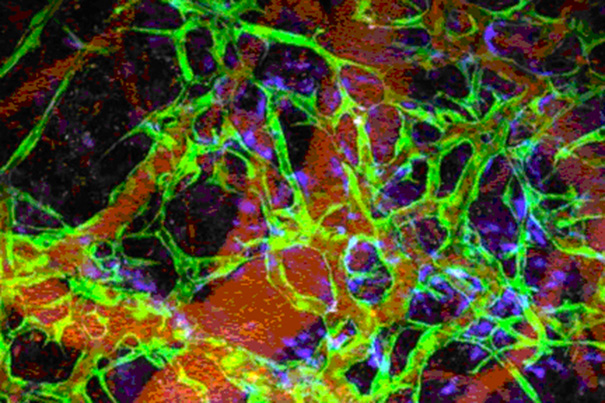Health
-

6 keys to a long, healthy life (ice cream included)
Also, why reading Ben Franklin beats climbing Mount Everest
-

Six cancers rising faster in younger adults than older ones
Large new global study fuels growing concern over trend of increases in several types

-

What’s next for GLP-1s?
Scientists eye new treatment targets for popular weight-loss drugs, from heart failure to addiction
-

Pricey blockbuster GLP-1s are costing users — and most of the rest of us, too
Health insurers are passing along cost for coverage in form of higher rates across the board, policy researcher says
-

Drinking 2-3 cups of coffee a day tied to lower dementia risk
Caffeinated tea also found to slow cognitive decline in study

-

New AI tool predicts brain age, dementia risk, cancer survival
Unlike other AI models, BrainIAC needs limited data to ID key neurological health indicators

-
Narrative of the body, with a nasty twist
Many modern chronic diseases result from mismatches between how our bodies evolved to be used and how we use them today, Harvard evolutionary biologist Daniel Lieberman writes in a new book.
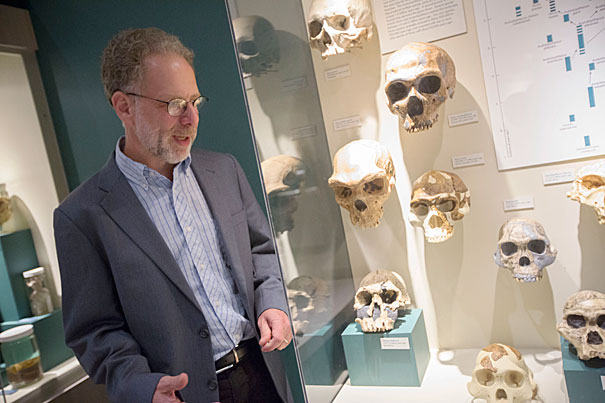
-
Programming genetic code can lead to better designer genes
The key to programming bacteria to follow orders has been found in its protein production. Researchers have learned that by using more rare words, or codons, near the start of a gene, they can remove roadblocks to protein production. The knowledge may mean new drugs and biofuels.

-
A foundation for future research
Harvard researchers recently developed the most detailed “specificity profile” for Cas9 — a “machine” made of protein and RNA that can be programmed to target specific DNA sequences and to precisely cut, paste, and turn on or turn off genes. Future researchers will use the data when developing genetic tools and therapies.
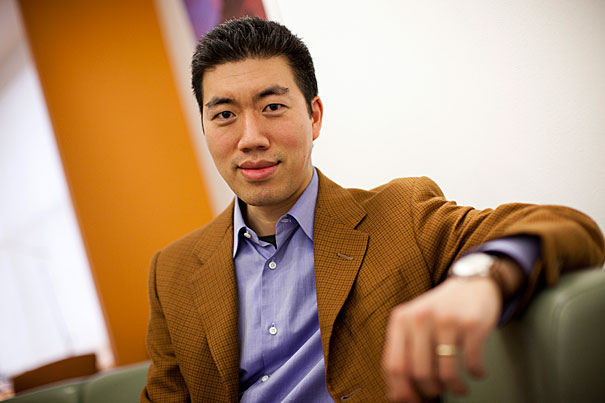
-
Marriage linked to better cancer outcomes
People who are married when diagnosed with cancer live longer than those who are not married. Married patients also tended to have cancers diagnosed at an earlier stage, according to Harvard researchers.

-
Legal remedies
Attorneys, judges, scholars and activists interested in expanding health rights through the law were at the Harvard School of Public Health to discuss progress and challenges.
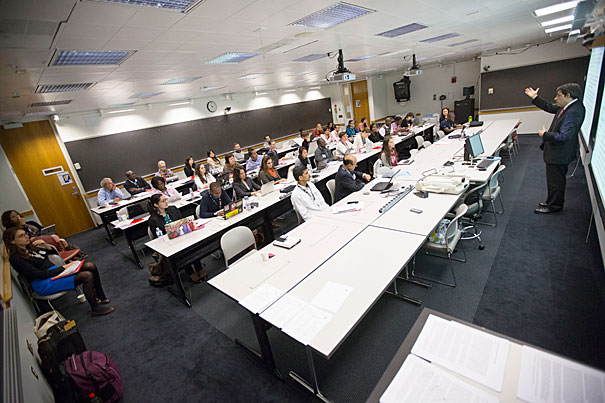
-
When bacteria fight back
After the U.S. Centers for Disease Control and Prevention issued a report on the threat from drug-resistant bacteria, David Hooper, a physician at Massachusetts General Hospital and an authority on the subject, discussed the issues during a question-and-answer session.

-
40% prevention rate for colorectal cancers
A Harvard study has found that 40 percent of all colorectal cancers might be prevented if people underwent regular colonoscopy screenings. The new research also supports existing guidelines that recommend that people with an average risk of colorectal cancer should have a colonoscopy every 10 years.
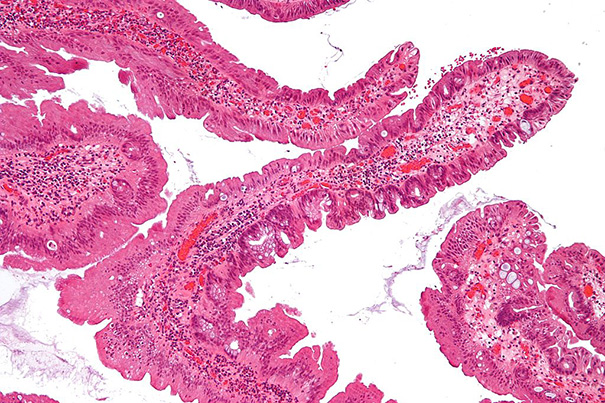
-
Recalling a lab-led rescue
Professor Howard Green stumbled across a skin transplant technique that involved growing keratinocytes into full skin layers, making him a pioneer in regenerative medicine.

-
The whys of rising obesity
A panel discussion held by the Forum at Harvard School of Public Health probed the reasons for the modern epidemic of overeating and its particularly harmful effects on children, who are especially susceptible to food marketing.
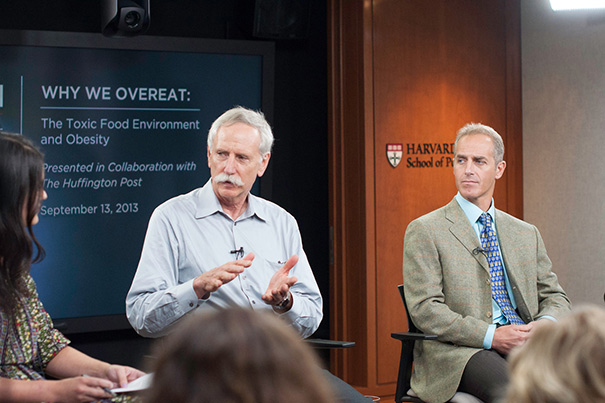
-
The good life, longer
By synthesizing the data collected in multiple government-sponsored health surveys conducted in recent decades, researchers from the National Bureau of Economic Research, Harvard University, and the University of Massachusetts were able to measure how the quality-adjusted life expectancy of Americans has changed over time.
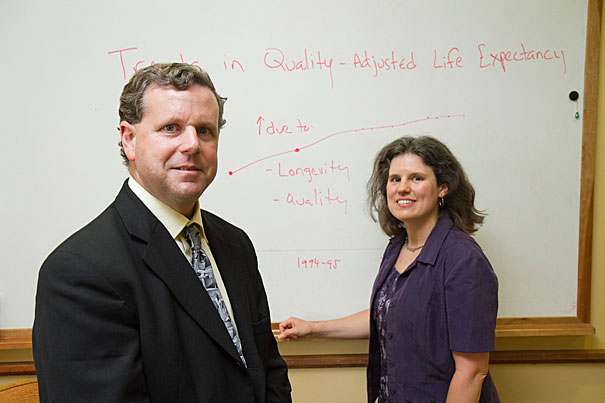
-
Lifting the ‘family curse’
Removing a woman’s healthy breasts might seem like a radical response to fears of breast cancer. But for women with genetic mutations that put them at high risk of developing the disease, it’s a step that can cut their vulnerability by 90 to 95 percent.

-
Summer in the lab
Students from local high schools spent a chunk of the summer at work in a Harvard lab as part of program co-sponsored by the University’s Life Sciences Education program and the Howard Hughes Medical Institute.
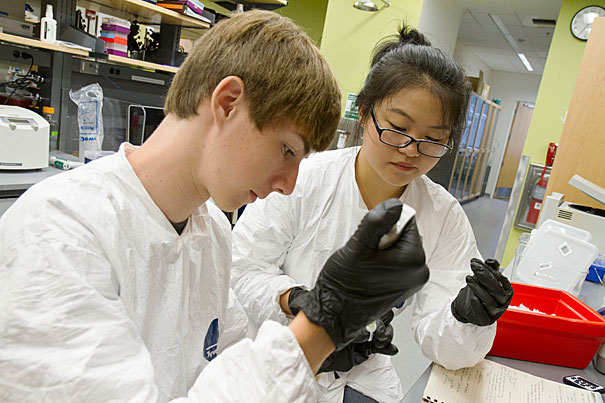
-
DNA glue directs tiny gel ‘bricks’ to self-assemble
A team of researchers at the Wyss Institute has found a way to self-assemble complex structures out of gel “bricks” smaller than a grain of salt. The new method could help solve one of the major challenges in tissue engineering.
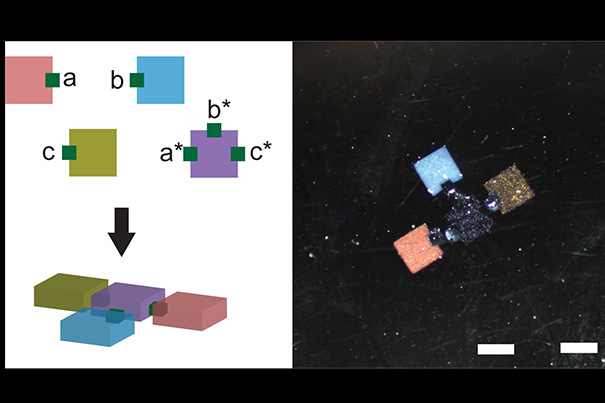
-
Destination space
Jessica Meir, an assistant professor of anesthesia at Harvard Medical School and Massachusetts General Hospital, is the latest member of the Harvard community given a chance to head to space, joining moon-walkers and Hubble Space Telescope repairmen as she trains to become a NASA astronaut.

-
Cancer vaccine begins Phase I clinical trials
A cross-disciplinary team of Harvard scientists, engineers, and clinicians announced Sept. 6 that they have begun a Phase I clinical trial of an implantable vaccine to treat melanoma, the most lethal form of skin cancer.

-
The little old machine that could
In the high-tech laboratory at the Arnold Arboretum’s Weld Hill Research Building, amid an array of expensive, shiny new equipment, sits a 1931 microtome, a machine whose well-oiled parts keep cranking out slices of tissue just 10 micrometers wide, thin enough for light to penetrate and perfect for making slides to see the internal cellular structure of plants.
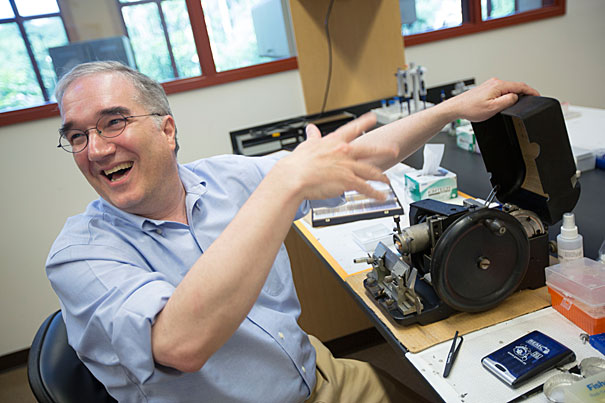
-
Lasering in on tumors
In the battle against brain cancer, doctors now have a new weapon: an imaging technology that will make brain surgery dramatically more accurate by allowing surgeons to distinguish between brain tissue and tumors, and at a microscopic level.
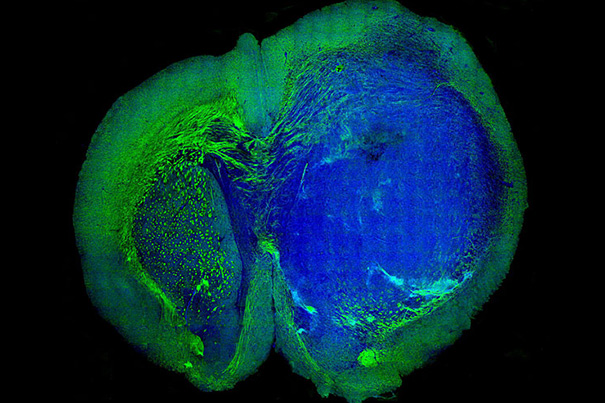
-
Skip the juice, go for whole fruit
Harvard researchers have found that people who ate at least two servings each week of certain whole fruits — particularly blueberries, grapes, and apples — reduced their risk for type 2 diabetes by as much as 23 percent in comparison to those who ate less than one serving per month.

-
Organs-on-chips evaluate therapies for lethal radiation exposure
A team at the Wyss Institute at Harvard has received a $5.6 million grant from the FDA to use its organs-on-chips technology to test human physiological responses to radiation and evaluate drugs designed to counter those effects.

-
A marker for breast cancer
An international scientific collaborative led by the Harvard Stem Cell Institute’s Kornelia Polyak has discovered why women who give birth in their early 20s are less likely to develop breast cancer than women who don’t, triggering a search for a way to confer this protective state on all women.
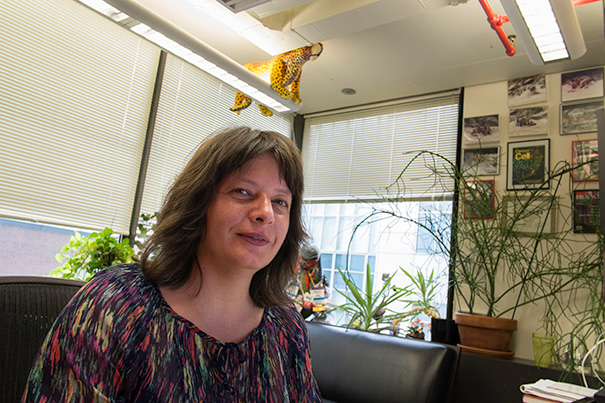
-
Getting around gluten
The Harvard Allston Education Portal on Thursday hosted a workshop examining the effects of gluten on health, with Jennifer Zartarian of Cambridge Health Associates answering questions and acting as a guide through the latest research.
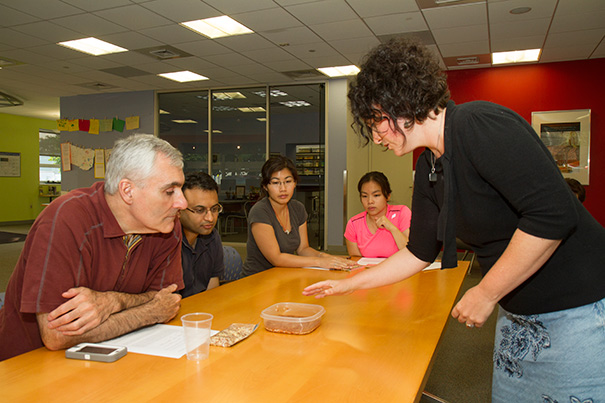
-
Vaccine works on hard-to-treat leukemia
Scientists at Harvard-affiliated Dana-Farber Cancer Institute observed a strong and selective immune response in some patients who received several doses of a “personalized” tumor vaccine composed of their own inactivated leukemia cells combined with an immune stimulant.
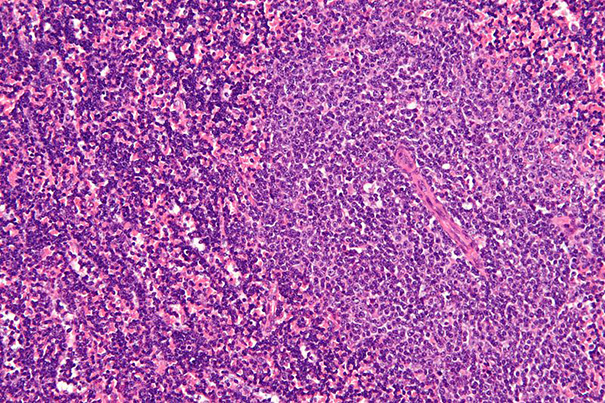
-
Nerve damage and fibromyalgia
About half of a small group of patients with fibromyalgia — a common syndrome that causes chronic pain and other symptoms — were found to have damage to nerve fibers in their skin and other evidence of a disease called small-fiber polyneuropathy.

-
A cross-country collaboration
Amy Wagers and Emmanuelle Passegué have found that cancer stem cells actively remodel the environment of bone marrow, where blood cells are formed, so that it is hospitable only to diseased cells. This finding could influence the effectiveness of bone marrow transplants.
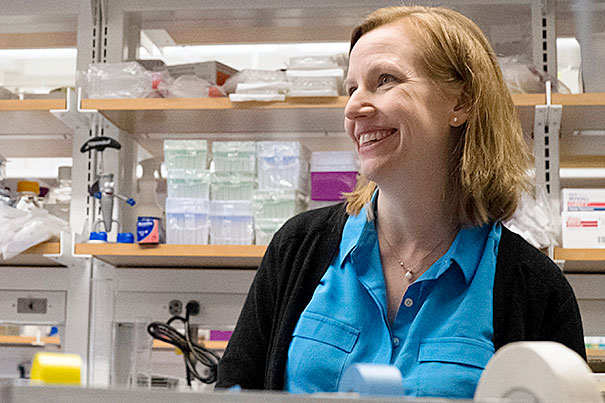
-
Good health lasts later in life
Working from data collected between 1991 and 2009 from almost 90,000 individuals who responded to the Medicare Current Beneficiary Survey, Professor David Cutler has found that, even as life expectancy has increased over the past two decades, people have become increasingly healthier later in life.

-
Coffee drinking tied to lower risk of suicide
Drinking several cups of coffee daily appears to reduce the risk of suicide in men and women by about 50 percent, according to a new study by researchers at the Harvard School of Public Health.

-
Bacterial blockade
Harvard researchers have identified a pair of genes that appear to be responsible for allowing a specific strain of bacteria in the human gut to break down Lanoxin — a widely prescribed cardiac drug — into an inactive compound, as well as a possible way to turn the process off.
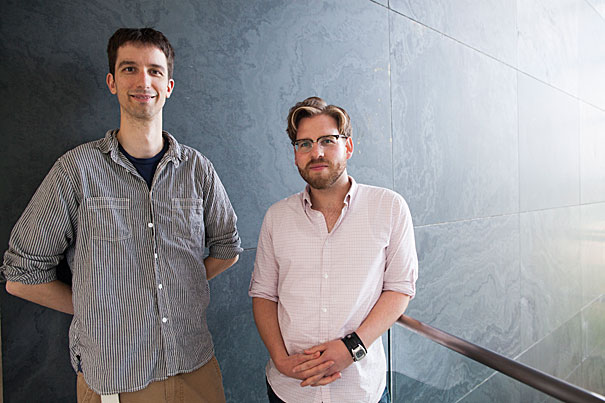
-
Clues to cholera resistance
Researchers have long understood that genetics can play a role in susceptibility to cholera, but a team of Harvard scientists is now uncovering evidence of genetic changes that might also help protect some people from contracting the deadly disease.
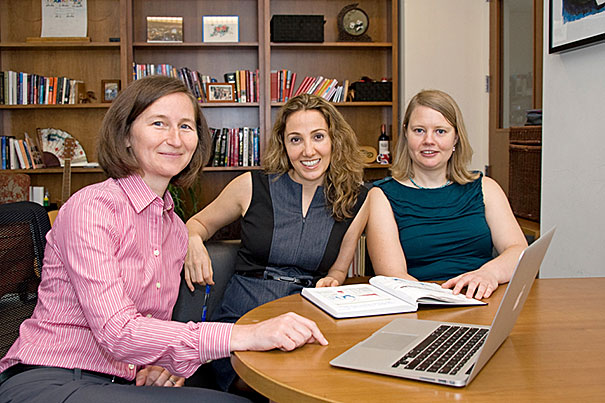
-
New plan of attack in cancer fight
Harvard Professor Martin Nowak and Ivana Bozic, a postdoctoral fellow in mathematics, show that, under certain conditions, using two drugs in a “targeted therapy” — a treatment approach designed to interrupt cancer’s ability to grow and spread — could effectively cure nearly all cancers.
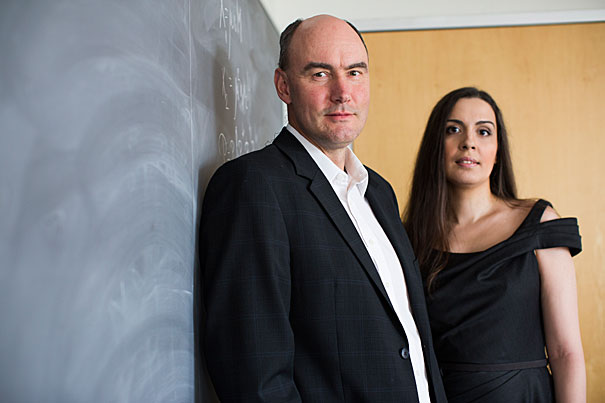
-
Reprogrammed cells generate blood vessels
Harvard researchers have generated long-lasting blood vessels from reprogrammed human cells. The study in the mouse model reveals both the potential and remaining challenges to vessel regeneration.
